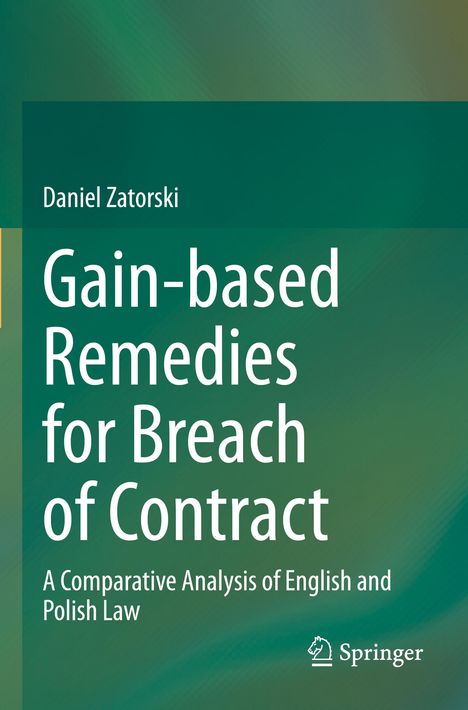Daniel Zatorski: Gain-based Remedies for Breach of Contract
Gain-based Remedies for Breach of Contract
Buch
- A Comparative Analysis of English and Polish Law
- Verlag:
- Springer International Publishing, 02/2024
- Einband:
- Kartoniert / Broschiert, Paperback
- Sprache:
- Englisch
- ISBN-13:
- 9783031254543
- Artikelnummer:
- 11767945
- Umfang:
- 176 Seiten
- Nummer der Auflage:
- 24001
- Auflage:
- 1st edition 2023
- Gewicht:
- 277 g
- Maße:
- 235 x 155 mm
- Stärke:
- 10 mm
- Artikelnummer:
- 11767945
- Erscheinungstermin:
- 16.2.2024
- Hinweis
-
Achtung: Artikel ist nicht in deutscher Sprache!
Weitere Ausgaben von Gain-based Remedies for Breach of Contract |
Preis |
|---|
Klappentext
This book focuses on an emerging problem in English contract law: what should be done when a party has been unjustly enriched as the result of a breach of contract but there is no measurable loss suffered by said party? Two rulings are at the heart of the book: Wrotham Park Estate v Parkside Homes and Attorney-General v Blake. These two cases can be said to have established gain-based remedies in English contract law. However, the principles that underpin these remedies are not entirely clear and are subject to debate.This book analyses these principles through the lens of compensatory and restitutionary approaches. Moreover, it applies a comparative analysis of these approaches through the lens of the civil law jurisdiction in Poland.
Since the term compensation is not a universal concept, the book distinguishes between two rationales in the compensatory analysis. The first, reparative compensation, is defined as a form of monetary recompense for loss or damage actually suffered. The second, substitutive compensation, represents a monetary equivalent to a right that a person has been deprived of or denied. Both rationales require the application of a broad notion of loss in order to make gain-based remedies workable in both English and Polish law.
In contrast, restitution states that a person cannot be permitted to profit from their own wrongdoing. Based on this principle, the book argues that gain-based remedies could be applied under Polish law through the rules of unjust enrichment. However, in order to do so, a broader understanding of the subtraction prerequisite (the enrichment being at the aggrieved party s expense) would have to be adopted. The book concludes that unjust enrichment is a more natural way of implementing gain-based remedies in civil law jurisdictions.


